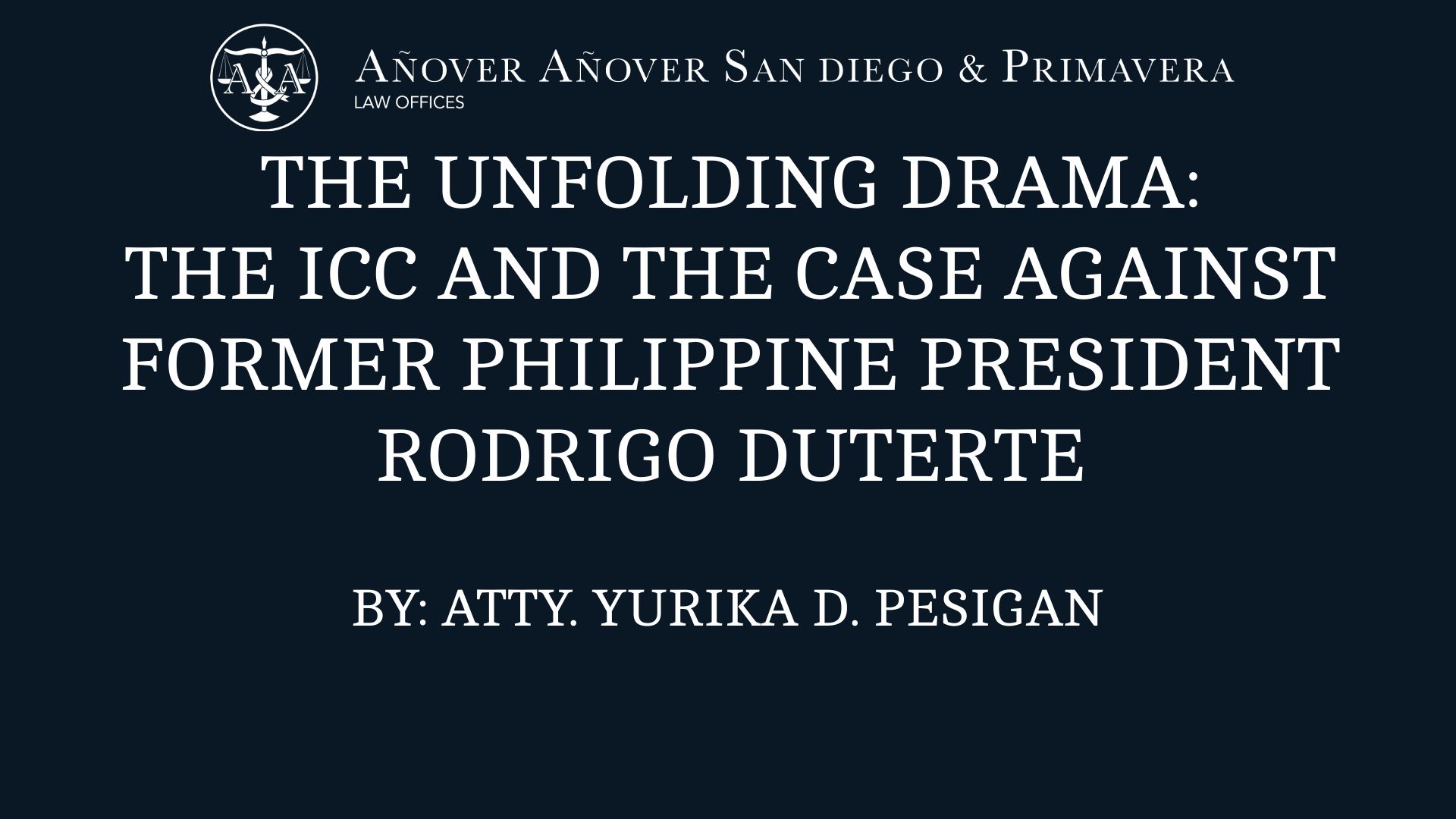DISCLAIMER: The foregoing article is a general discussion of some of the key legal principles which govern the Rome Statute and ICC procedure in the context of the current state of affairs and is not intended to promote any political viewpoint or agenda, nor does it represent to be an opinion of the Firm, the partners, or any of its lawyers on this issue)
In the world of international justice, a case filed with the International Criminal Court (ICC) is no small matter, especially if the case is filed against a former president. It reverberates far beyond legal circles, igniting political debates and global scrutiny. The ICC, governed by an international treaty called the Rome Statute, is tasked with prosecuting individuals for the most heinous crimes: genocide, war crimes, crimes against humanity, and the crime of aggression. These are crimes that shock the conscience of the world, and the court’s mission is clear: to hold those responsible accountable when national courts fail to do so or are unwilling to.
The issue of ICC’s jurisdiction is no less significant and is worth examining here. Once a state becomes a party to the Rome Statute, the ICC may take jurisdiction over those particular crimes committed within the territory of such State Party, or when the suspect is a national of that State Party, or in those states that accept the court’s jurisdiction. In the event of withdrawal from the treaty by a State Party, the ICC’s jurisdiction remains intact for crimes committed before such withdrawal.
In the ICC case of former Philippine president Rodrigo Roa Duterte, one might wonder how the case against him was commenced and how it was built up.
For Duterte, the storm began in 2017, when Atty. Jude Sabio filed a communication with the Office of the Prosecutor of ICC, accusing Duterte of crimes against humanity related to the war on drugs. The charges were further bolstered by former Senator Antonio “Sonny” F. Trillanes IV and Magdalo Party-list Representative Gary C. Alejano, who submitted additional communication in June 2017. According to Article 15 of the Rome Statute, the Prosecutor can initiate an investigation "proprio motu" (on their own initiative) based on information made available to it, and it was from this communication that the investigation against Duterte was born.
This is a critical point: the ICC does not seek to undermine national systems of justice but to complement it when those systems fail, or when states are unwilling or unable to act on it genuinely. After the Pre-Trial Chamber I of the ICC authorized the Office of the Prosecutor to investigate, the Republic of the Philippines requested that the investigation be deferred pursuant to Article 18(2) of the Rome Statute. In this Request, the Republic of the Philippines claims that it is already investigating the case. This was however denied by the Pre-Trial Chamber since it was not satisfied that there was relevant investigation being conducted.
Fast forward to 10 February 2025, when the ICC’s Office of the Prosecutor formally sought an arrest warrant for Duterte for crimes against humanity allegedly committed between 01 November 2011, and 16 March 2019. The ICC Pre-Trial Chamber I, after reviewing the evidence, determined there were reasonable grounds to believe that Duterte was an "indirect co-perpetrator" of these atrocities.
On March 7, 2025, the ICC issued an arrest warrant for Duterte, initially classifying it as "secret." However, by March 11, the warrant was reclassified as "public," and on March 12, Duterte was arrested by Philippine authorities, who had cooperated with the ICC in executing the warrant. This was no ordinary arrest; it was a momentous event that sent shockwaves across the Philippines and the world.
The arrest sparked an avalanche of questions. Why had Duterte, once a staunch defender of his policies and an ally of the current Philippine president, Ferdinand “Bongbong” Marcos Jr., been allowed to be taken into custody by the ICC? Was this an indication of the Philippine government’s inability or unwillingness to prosecute Duterte’s actions domestically? Or, was it a calculated political move, a strategic distancing from the former president in the face of international pressure?
In reality, the ICC operates without its own police force or enforcement arm. It relies on the cooperation of member states to execute warrants and transfer the arrested to the detainment center in The Hague, Netherlands. This cooperation is fundamental, and the Philippines, under Marcos, has assisted in Duterte’s arrest, signaling a shift that raises more questions than answers. Is the Philippine justice system truly incapable of handling such high-profile cases? Or is this a sign of a broader political maneuver within the country? Could this event trigger widespread unrest or even a revolution? As of now, no one can say for sure.
What we do know is this: the trial of former President Rodrigo Duterte before the ICC is a historic moment, one that will shape not just the future of Philippine politics but also the way the international community views accountability for state-sanctioned violence. As the world watches with bated breath, the question lingers: what will this mean for the future of international justice? How will it affect the Philippines’ standing on the world stage? Only time will tell, but one thing is certain—the drama is far from over.
ATTY. YURIKA D. PESIGAN (ydp@anoverlaw.org) is an associate lawyer of the Firm. Yuri earned her Juris Doctor from the De la Salle University Tañada Diokno School of Law in 2023 and was admitted to the Bar in 2024, with experience in litigation, labor and employment, corporate law, and intellectual property law.

